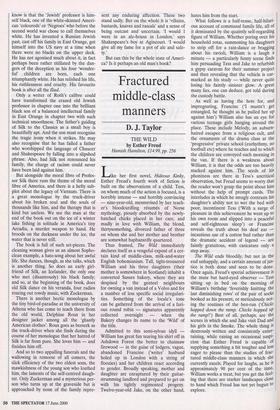Fractured middle-class manners
D J. Taylor
THE WILD by Esther Freud
Hamish Hamilton, £14.99, pp. 256 Like her first novel, Hideous Kinky, Esther Freud's fourth work of fiction is built on the observations of a child. Tess, on whom much of the action is focused, is a horribly intense — and horribly convincing — nine-year-old, mesmerised by her teach- er's bloodcurdling résumés of Norse mythology, piously absorbed by the newly- hatched chicks placed in her care, and madly in love with William, the blond, thirtysomething, divorced father of three on whom she and her mother and brother are somewhat haphazardly quartered.
Thus framed, The Wild immediately declares itself as a vengeful exposé of a cer- tain kind of middle-class, milk-and-water English bohemianism. Tall, tight-trousered William and his three daughters (their mother is somewhere in Scotland) inhabit a converted Sussex bakery, where they are despised by the genteel neighbours for owning a van instead of a Volvo and for a number of less specific social irregulari- ties. Something of the locale's tone can be gathered from the arrival of a furi- ous round robin — signatures apparently collected overnight — when the Bakery changes its name to the 'Wild' of the title.
Admitted to this semi-sylvan idyll — William has great fun tearing his shirt off in Ashdown Forest the better to chainsaw firewood — in the guise of lodgers, vague, abandoned Francine (*rite? husband holed up in London with a string of floozies) and her children react according to gender. Broadly speaking, mother and daughter are enraptured by their guitar- strumming landlord and prepared to get on with his tightly regimented progeny. Twelve-year-old Jake, on the other hand, hates him from the start.
What follows is a half-tense, half-hilari- ous account of communal family life, all of it dominated by the quaintly self-regarding figure of William. Whether poring over his household rotas, summoning his daughters to strip off for a rain-dance or bragging about his ravioli, William is a laugh a minute — a particularly funny scene finds him persuading Tess and Jake to refurbish a gypsy caravan for their summer project and then revealing that the vehicle is ear- marked as his study — while never quite losing his faintly sinister glow. A great many lies, one can deduce, got told during the custody battle.
As well as having the hots for, and impregnating, Francine CI mustn't get entangled, he thought as he pulled her up against him') William also has an eye for various teenage girls hanging around the place. These include Melody, an auburn- haired escapee from a religious cult, and the ornaments of the drama class at the 'progressive' private school (eurhythmy, no football etc) where he teaches and to which the children are conveyed each morning in the van. If there is a weakness about William, it is that the odds are too heavily stacked against him. The seeds of his phoniness are there in Tess's uncritical observation, but Freud seems to worry that the reader won't grasp the point about hire without the help of prompt cards. The interludes in which he smugly contrasts his daughter's ability not to wet the bed with poor, incontinent Tess (With a surge of pleasure in this achievement he went up to his own room and slipped into a peaceful and self-righteous sleep') or Francine reveals the truth about his deaf ear — incautious use of a cotton bud rather than the dramatic accident of legend — are faintly gratuitous, with caricature only a step away.
The Wild ends bloodily, but not in the end unhappily, and a certain amount of jus- tice is both done and seen to be done. Once again, Freud's special achievement is the mute but hard-eyed observer — Tess sitting up in bed on the morning of William's birthday 'feverishly knitting the last diminishing rows' of the pair of socks booked as his present, or meticulously not- ing the routines of the hen-run (`Chicks hopped down the ramp. Chicks hopped UP the ramp!') Best of all, perhaps, are the scenes in which she and Jake visit Dad and his girls in the Smoke. The whole thing is dextrously written and consistently enter- taining, while raising an occasional suspi- cion that Esther Freud is capable of supplying something a bit tougher and less eager to please than the studies of frac- tured middle-class manners in which she currently excels. Played for laughs, as he is approximately 90 per cent of the time, William works a treat, but you get the feel- ing that there are starker landscapes close to hand which Freud has not yet begun to explore.










































































 Previous page
Previous page